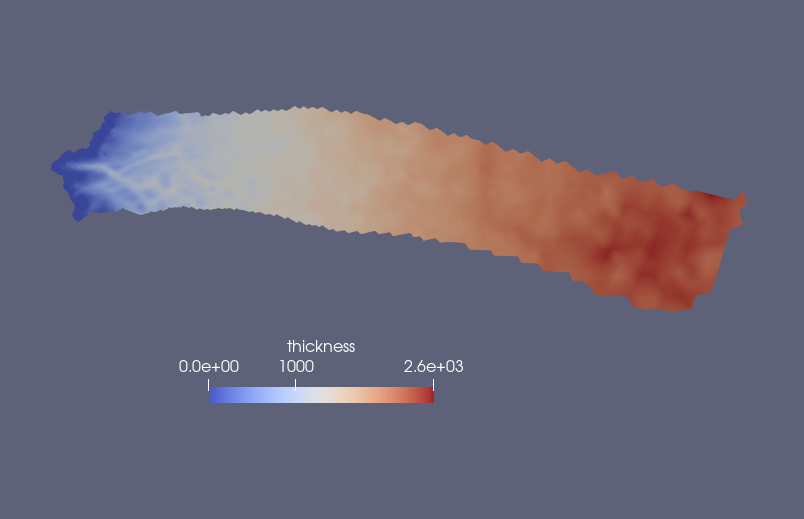isunnguata_sermia
The landice/isunnguata_sermia test group includes a test case for creating a
mesh for Isunnguata Sermia, Greenland. The optimization for basal friction
happens outside of COMPASS because it requires expert usage and takes a
larger amount of computing resources than COMPASS is typically run with.

Ice thickness in meters on Isunnguata Sermia 1-10km variable resolution mesh.
The test group includes a single test case that creates the variable resolution mesh.
config options
The test group uses the following default config options. At this point only the mesh generation options are adjusted through the config file.
# config options for isunnguata sermia test cases
[mesh]
# number of levels in the mesh
levels = 10
# Bounds of isunnguata sermia domain
x_min = -263230.
x_max = 130000.
y_min = -2600000
y_max = -2400000.
# distance from ice margin to cull (km).
# Set to a value <= 0 if you do not want
# to cull based on distance from margin.
cull_distance = 5.0
# mesh density parameters
# minimum cell spacing (meters)
min_spac = 1.e3
# maximum cell spacing (meters)
max_spac = 1.e4
# log10 of max speed (m/yr) for cell spacing
high_log_speed = 2.0
# log10 of min speed (m/yr) for cell spacing
low_log_speed = 0.
# distance at which cell spacing = max_spac (meters)
high_dist = 1.e5
# distance within which cell spacing = min_spac (meters)
low_dist = 1.e4
# distance at which bed topography has no effect
high_dist_bed = 1.e5
# distance within which bed topography has maximum effect
low_dist_bed = 5.e4
# Bed elev beneath which cell spacing is minimized
low_bed = 50.0
# Bed elev above which cell spacing is maximized
high_bed = 100.0
# mesh density functions
use_speed = True
use_dist_to_grounding_line = False
use_dist_to_edge = False
use_bed = False
mesh_gen
landice/isunnguata_sermia/mesh_gen creates a variable resolution mesh.
The default is 1-10km resolution with mesh density determined by
observed ice speed. There is no model integration step.